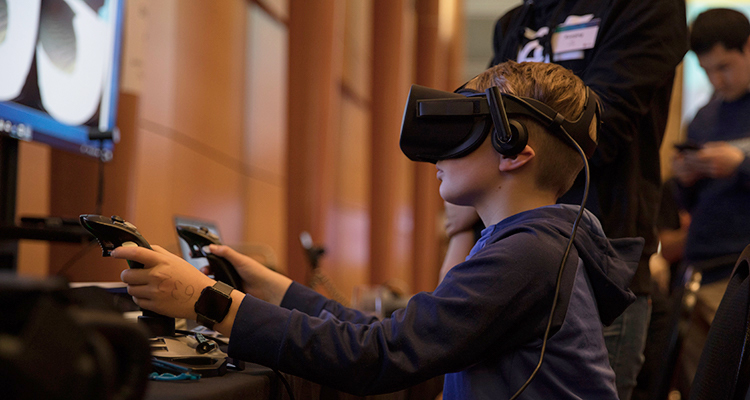
The Inspired Learning Summit hosted demonstrations of our evolving learning experience and a dynamic panel discussion on the ethical use of student data
“There are many concerns around the retention of data, particularly student data. The real question is what sort of responsibilities and obligations that we, as an institution, have in place for collecting this data in the first place,“ said Richard Sanchez, Head of Reporting and Analytics at UNSW, at last week’s Inspired Learning Summit.
Held in the Scientia building, the one-day conference provided the rare opportunity to witness the ways in which learning is rapidly evolving and shaping students’ experience by the integration of leading-edge educational design and technology.
Attendees heard a dynamic panel discussion regarding the much-debated topic of the ethical use of student data. The panel included a broad selection of academics, leaders in data analytics and data governance, and UNSW students. The panel highlighted some of the key issues about privacy, confidentiality and data access. The conversations focused on what UNSW student data is being used for, and in a world where everyone has a digital footprint, how we ensure this data is being used effectively and ethically to benefit students and learning.
“We are aiming to operationalise the system so that students have the option to opt out or provide consent for us to use their data in the first place,” said Richard.
Panellists noted that the use of data is a key element in improving the learning environment and quality of the student experience, especially considering the issue of personalisation of learning based on evidence or automations. “Through the data available to us, we’re able to map trends, i.e. areas that are working, and those that need improvement. This enables us to further track behaviour, measure it against those students who perform well, and delve deeper into how to create a much better learning experience overall,” noted Associate Professor Louise Lutze-Mann, Director of Education-focussed Career Development, Inaugural UNSW Scientia Education Fellow.
With a broader sense of reconceptualising student data, student panellists Tara Sutjarittham and Jay Zabakly went on to discuss ways in which they would feel comfortable using their data for third party research via the use of anonymised data, therefore no longer linked to the individual. They went on to say that opening the lines of communication on the use of student information, and creating a transparent environment between all parties, was a clear theme that students would like to see become a reality.
Digital partnerships in action
Earlier in the day was the Summit’s impactful Multimedia Showcase, where attendees had the opportunity to experience the innovative technologies that are currently being implemented across a large range of university courses. The creators included PVC(E) Educational Developers, UNSW Course Convenors and Student Partners, who presented at individual stations, bringing their redesigned course elements to life through a number of cutting edge digital designs. A feature of the showcase was the Immersive Technologies station, led by Luis (Carlos) Dominguez, where an augmented and virtual reality for medicine students was on display. The virtual tool, when worn, allows the student to see first-hand what a patient may be dealing with when they have a specific eye disease, such as Tunnel Vision. This evolution in practical learning for future medicine professionals has a huge potential to impact, shape and transform the way in which we are able to diagnose and treat future patients.
Challenging issues of inclusion with a student partnership
Attendees also heard from keynote speaker, Abby Himashi Jayasuriya, a PhD student specialising in ethnomusicology. As a baby, Abby was diagnosed with a visual impairment called retinitis pigmentosa. Throughout her education she overcame many difficulties through a strong reliance on technology, such as online, and interactive learning systems that have the capability to read a book aloud and change the colours automatically, which in turn allows the text to become readable to Abby. Openly sparking awareness of the road blocks visually impaired students face daily within education, many academics in the audience came forward to ask queries on how they can receive training on the digital tools and systems mentioned, to ensure all students in Abby’s position are able to access their content.
“The Inspired Learning Summit is about highlighting innovation, focusing on ways in which we can achieve outcomes by integrating digital into the core business model, and transforming how we work with students on a day to day basis” said Pro Vice-Chancellor (Education), Professor Geoff Crisp.
You can read more about the Inspired Learning Summit and the tools shown at the Multimedia showcase here.
To receive further follow-up information, including links to resources and to the panel debate’s video recording, and to learn about similar events, subscribe to the PVC (Education) e-news @: https://teaching.unsw.edu.au/ebulletin
- Log in to post comments
